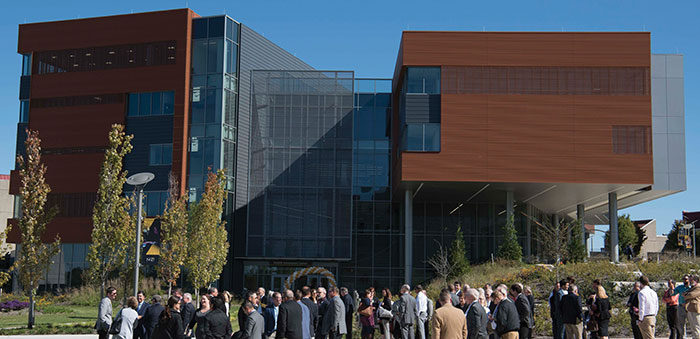By Greg Paeth

Tracing its roots to 1861, St. Elizabeth Healthcare built its first hospital after a $2,000 fundraising effort by a widow named Henrietta Cleveland. The healthcare system has come a long way, and in 2018 opened an advanced $105 million Health Innovation Center in conjunction with Northern Kentucky University.
 State-of-the-art technology and learning facilities – featuring the St. Elizabeth Healthcare Simulation Center – make the HIC one of the largest and most comprehensive health professions buildings in the country. Yet it’s just one element of St. Elizabeth’s massive regional presence, including five emergency rooms in Northern Kentucky.
State-of-the-art technology and learning facilities – featuring the St. Elizabeth Healthcare Simulation Center – make the HIC one of the largest and most comprehensive health professions buildings in the country. Yet it’s just one element of St. Elizabeth’s massive regional presence, including five emergency rooms in Northern Kentucky.
In 2018 St. Elizabeth treated some 315,000 patients at about 120 hospitals, clinics and offices in Kentucky, Ohio and Indiana. The healthcare conglomerate’s officials give much credit for its success to good relationships.
“A key theme for this year – and other health care systems are feeling the same – is partnerships and collaboration are certainly a key theme to try to solve some of the big issues that we’re all wrestling with,” said Sarah Giolando, senior vice president and chief strategy officer for St. Elizabeth.
St. Elizabeth’s impressive numbers, which make it predominant across Northern Kentucky, contribute to the Cincinnati Metropolitan area’s overall high marks for healthcare.
No. 1 in the nation
Northern Kentucky is part of the Cincinnati Metropolitan area, the 29th largest in the country with about 2.2 million people, and a highly competitive multibillion-dollar healthcare landscape.
Healthgrades, an online site that helps people find doctors and hospitals, said in its 2019 National Health Index that Greater Cincinnati ranked No. 1 in the country for cities of more than 1 million in an evaluation of access to care, the overall health of the population, hospital quality and the number of well regarded medical specialists who practice in the region.
Quality care doesn’t come on the cheap, and the health sector is a large part of what keeps the region’s economy moving at full steam.
St. Elizabeth had “net patient revenues” of $957.4 million, fifth most in the region, and a net profit of $115 million, third in the region, for 2016, according to the 2018 Ohio Health Market Review, a publication from the Minneapolis-based Allan Baumgarten organization that scrutinizes health care data around the country.
The Tri-Health system, Cincinnati Children’s Hospital and Christ Hospital, University of Cincinnati Health and Mercy Health also have substantial presences in Northern Kentucky.
A number of other institutions played major roles in St. Elizabeth’s success in 2018, Giolando said.
One key partnership is with SUN Behavioral Health of Red Bank, N.J., which worked with St. Elizabeth, the minority partner, to open a $40 million, 197-bed psychiatric hospital in Erlanger last February.
Collaborative care
Less than two weeks after opening the new hospital, St. Elizabeth announced it joined the Markey Cancer Center Affiliate Network at the University of Kentucky. Markey in nearby Lexington is the only National Cancer Institute-designated facility in the state and one of 70 in the country. It has more than 20 local affiliates, including Christ Hospital in Cincinnati.
Markey network patients have access to new drugs, treatment options and clinical trials offered only at NCI centers.
Improved cancer care
It was St. Elizabeth’s second big collaboration with UK; one of three new regional campuses for the UK Medical School will come to NKU with St. Elizabeth backing and participation, the partners announced in 2017. Giolando said the important partnership to address the shortage of doctors in the commonwealth took several major steps in 2018.
“It’s becoming very real,” she said. “The first students have been accepted. They’ll start in August of 2019 (with their) first two years on the NKU campus and next two years on our Edgewood (hospital) campus.”
The hospital in August 2018 again demonstrated its commitment to improve cancer care in a state that has the country’s highest death rate from the disease when St. Elizabeth broke ground for a $140 million cancer center in Edgewood.
“We’re really excited not just to build the building, but to bring together a new way of cancer care that really, truly puts the patient in the center and brings multidisciplinary physicians around that patient to create one care plan, one path for the patient so it’s clear how they’re going to fight this terrible disease,” Giolando said.
Heart disease also attracts plenty of attention at St. Elizabeth, where the hospital became the seventh health care system in the nation to receive accreditation from the American Heart Association for its heart and vascular program. Giolando said St. Elizabeth is the only AHA accredited hospital in Kentucky and in Greater Cincinnati.
On consecutive days in mid-October, some of St. Elizabeth’s top officials were at NKU for a building dedication and a groundbreaking.
St. Elizabeth was recognized for an $8 million donation to the university to fund the Healthcare Simulation Center in the $105 million Health Innovation Center on the Highland Heights campus. The next day the hospital and five partners broke ground for a 70,000-s.f. building for St. Elizabeth Physicians on Nunn Drive, the primary road that leads to NKU. In addition to the university and the city, other partners are OrthoCincy, Campbell County and Fairmount Properties.
Outside of the region, St. Elizabeth has taken a major role in Balanced Health Kentucky, where CEO and President Garren Colvin is one of six hospital officials who are trying to address a state Medicaid budget shortfall of $200 to $300 million. Without that money, healthcare coverage for 500,000 Kentuckians will end, Balanced Health said.
In one more illustration about the importance of partnerships, the Northern Kentucky Health Department, the Northern Kentucky Chamber of Commerce and St. Elizabeth worked together to host a visit by U.S. Surgeon General Jerome Adams, who focused on the nation’s opioid crisis and the importance of having quick access to naloxone to treat people who have overdosed.




















Add Comment